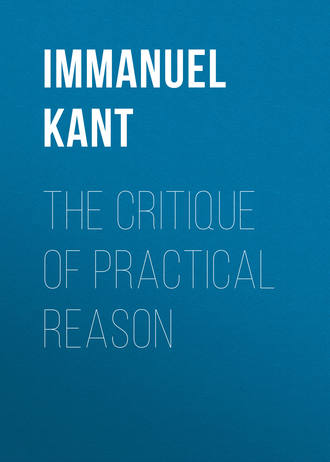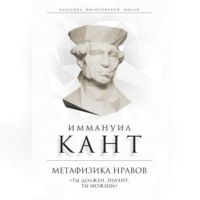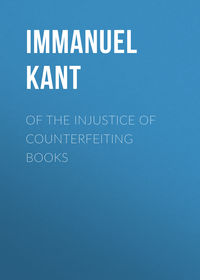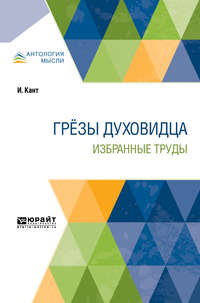 полная версия
полная версияThe Critique of Practical Reason
But how is it with the application of this category of causality (and all the others; for without them there can be no knowledge of anything existing) to things which are not objects of possible experience, but lie beyond its bounds? For I was able to deduce the objective reality of these concepts only with regard to objects of possible experience. But even this very fact, that I have saved them, only in case I have proved that objects may by means of them be thought, though not determined a priori; this it is that gives them a place in the pure understanding, by which they are referred to objects in general (sensible or not sensible). If anything is still wanting, it is that which is the condition of the application of these categories, and especially that of causality, to objects, namely, intuition; for where this is not given, the application with a view to theoretic knowledge of the object, as a noumenon, is impossible and, therefore, if anyone ventures on it, is (as in the Critique of Pure Reason) absolutely forbidden. Still, the objective reality of the concept (of causality) remains, and it can be used even of noumena, but without our being able in the least to define the concept theoretically so as to produce knowledge. For that this concept, even in reference to an object, contains nothing impossible, was shown by this, that, even while applied to objects of sense, its seat was certainly fixed in the pure understanding; and although, when referred to things in themselves (which cannot be objects of experience), it is not capable of being determined so as to represent a definite object for the purpose of theoretic knowledge; yet for any other purpose (for instance, a practical) it might be capable of being determined so as to have such application. This could not be the case if, as Hume maintained, this concept of causality contained something absolutely impossible to be thought.
In order now to discover this condition of the application of the said concept to noumena, we need only recall why we are not content with its application to objects of experience, but desire also to apply it to things in themselves. It will appear, then, that it is not a theoretic but a practical purpose that makes this a necessity. In speculation, even if we were successful in it, we should not really gain anything in the knowledge of nature, or generally with regard to such objects as are given, but we should make a wide step from the sensibly conditioned (in which we have already enough to do to maintain ourselves, and to follow carefully the chain of causes) to the supersensible, in order to complete our knowledge of principles and to fix its limits; whereas there always remains an infinite chasm unfilled between those limits and what we know; and we should have hearkened to a vain curiosity rather than a solid-desire of knowledge.
But, besides the relation in which the understanding stands to objects (in theoretical knowledge), it has also a relation to the faculty of desire, which is therefore called the will, and the pure will, inasmuch as pure understanding (in this case called reason) is practical through the mere conception of a law. The objective reality of a pure will, or, what is the same thing, of a pure practical reason, is given in the moral law a priori, as it were, by a fact, for so we may name a determination of the will which is inevitable, although it does not rest on empirical principles. Now, in the notion of a will the notion of causality is already contained, and hence the notion of a pure will contains that of a causality accompanied with freedom, that is, one which is not determinable by physical laws, and consequently is not capable of any empirical intuition in proof of its reality, but, nevertheless, completely justifies its objective reality a priori in the pure practical law; not, indeed (as is easily seen) for the purposes of the theoretical, but of the practical use of reason. Now the notion of a being that has free will is the notion of a causa noumenon, and that this notion involves no contradiction, we are already assured by the fact- that inasmuch as the concept of cause has arisen wholly from pure understanding, and has its objective reality assured by the deduction, as it is moreover in its origin independent of any sensible conditions, it is, therefore, not restricted to phenomena (unless we wanted to make a definite theoretic use of it), but can be applied equally to things that are objects of the pure understanding. But, since this application cannot rest on any intuition (for intuition can only be sensible), therefore, causa noumenon, as regards the theoretic use of reason, although a possible and thinkable, is yet an empty notion. Now, I do not desire by means of this to understand theoretically the nature of a being, in so far as it has a pure will; it is enough for me to have thereby designated it as such, and hence to combine the notion of causality with that of freedom (and what is inseparable from it, the moral law, as its determining principle). Now, this right I certainly have by virtue of the pure, not-empirical origin of the notion of cause, since I do not consider myself entitled to make any use of it except in reference to the moral law which determines its reality, that is, only a practical use.
If, with Hume, I had denied to the notion of causality all objective reality in its [theoretic] use, not merely with regard to things in themselves (the supersensible), but also with regard to the objects of the senses, it would have lost all significance, and being a theoretically impossible notion would have been declared to be quite useless; and since what is nothing cannot be made any use of, the practical use of a concept theoretically null would have been absurd. But, as it is, the concept of a causality free from empirical conditions, although empty, i.e., without any appropriate intuition), is yet theoretically possible, and refers to an indeterminate object; but in compensation significance is given to it in the moral law and consequently in a practical sense. I have, indeed, no intuition which should determine its objective theoretic reality, but not the less it has a real application, which is exhibited in concreto in intentions or maxims; that is, it has a practical reality which can be specified, and this is sufficient to justify it even with a view to noumena.
{BOOK_1|CHAPTER_1 ^paragraph 155}
Now, this objective reality of a pure concept of the understanding in the sphere of the supersensible, once brought in, gives an objective reality also to all the other categories, although only so far as they stand in necessary connexion with the determining principle of the will (the moral law); a reality only of practical application, which has not the least effect in enlarging our theoretical knowledge of these objects, or the discernment of their nature by pure reason. So we shall find also in the sequel that these categories refer only to beings as intelligences, and in them only to the relation of reason to the will; consequently, always only to the practical, and beyond this cannot pretend to any knowledge of these beings; and whatever other properties belonging to the theoretical representation of supersensible things may be brought into connexion with these categories, this is not to be reckoned as knowledge, but only as a right (in a practical point of view, however, it is a necessity) to admit and assume such beings, even in the case where we [conceive] supersensible beings (e.g., God) according to analogy, that is, a purely rational relation, of which we make a practical use with reference to what is sensible; and thus the application to the supersensible solely in a practical point of view does not give pure theoretic reason the least encouragement to run riot into the transcendent.
BOOK_1|CHAPTER_2
CHAPTER II. Of the Concept of an Object of Pure Practical Reason
By a concept of the practical reason I understand the idea of an object as an effect possible to be produced through freedom. To be an object of practical knowledge, as such, signifies, therefore, only the relation of the will to the action by which the object or its opposite would be realized; and to decide whether something is an object of pure practical reason or not is only to discern the possibility or impossibility of willing the action by which, if we had the required power (about which experience must decide), a certain object would be realized. If the object be taken as the determining principle of our desire, it must first be known whether it is physically possible by the free use of our powers, before we decide whether it is an object of practical reason or not. On the other hand, if the law can be considered a priori as the determining principle of the action, and the latter therefore as determined by pure practical reason, the judgement whether a thing is an object of pure practical reason or not does not depend at all on the comparison with our physical power; and the question is only whether we should will an action that is directed to the existence of an object, if the object were in our power; hence the previous question is only as the moral possibility of the action, for in this case it is not the object, but the law of the will, that is the determining principle of the action. The only objects of practical reason are therefore those of good and evil. For by the former is meant an object necessarily desired according to a principle of reason; by the latter one necessarily shunned, also according to a principle of reason.
If the notion of good is not to be derived from an antecedent practical law, but, on the contrary, is to serve as its foundation, it can only be the notion of something whose existence promises pleasure, and thus determines the causality of the subject to produce it, that is to say, determines the faculty of desire. Now, since it is impossible to discern a priori what idea will be accompanied with pleasure and what with pain, it will depend on experience alone to find out what is primarily good or evil. The property of the subject, with reference to which alone this experiment can be made, is the feeling of pleasure and pain, a receptivity belonging to the internal sense; thus that only would be primarily good with which the sensation of pleasure is immediately connected, and that simply evil which immediately excites pain. Since, however, this is opposed even to the usage of language, which distinguishes the pleasant from the good, the unpleasant from the evil, and requires that good and evil shall always be judged by reason, and, therefore, by concepts which can be communicated to everyone, and not by mere sensation, which is limited to individual [subjects] and their susceptibility; and, since nevertheless, pleasure or pain cannot be connected with any idea of an object a priori, the philosopher who thought himself obliged to make a feeling of pleasure the foundation of his practical judgements would call that good which is a means to the pleasant, and evil, what is a cause of unpleasantness and pain; for the judgement on the relation of means to ends certainly belongs to reason. But, although reason is alone capable of discerning the connexion of means with their ends (so that the will might even be defined as the faculty of ends, since these are always determining principles of the desires), yet the practical maxims which would follow from the aforesaid principle of the good being merely a means, would never contain as the object of the will anything good in itself, but only something good for something; the good would always be merely the useful, and that for which it is useful must always lie outside the will, in sensation. Now if this as a pleasant sensation were to be distinguished from the notion of good, then there would be nothing primarily good at all, but the good would have to be sought only in the means to something else, namely, some pleasantness.
It is an old formula of the schools: Nihil appetimus nisi sub ratione boni; Nihil aversamur nisi sub ratione mali, and it is used often correctly, but often also in a manner injurious to philosophy, because the expressions boni and mali are ambiguous, owing to the poverty of language, in consequence of which they admit a double sense, and, therefore, inevitably bring the practical laws into ambiguity; and philosophy, which in employing them becomes aware of the different meanings in the same word, but can find no special expressions for them, is driven to subtile distinctions about which there is subsequently no unanimity, because the distinction could not be directly marked by any suitable expression. 9
{BOOK_1|CHAPTER_2 ^paragraph 5}
The German language has the good fortune to possess expressions which do not allow this difference to be overlooked. It possesses two very distinct concepts and especially distinct expressions for that which the Latins express by a single word, bonum. For bonum it has das Gute [good], and das Wohl [well, weal], for malum das Bose [evil], and das Ubel [ill, bad], or das Well [woe]. So that we express two quite distinct judgements when we consider in an action the good and evil of it, or our weal and woe (ill). Hence it already follows that the above quoted psychological proposition is at least very doubtful if it is translated: "We desire nothing except with a view to our weal or woe"; on the other hand, if we render it thus: "Under the direction of reason we desire nothing except so far as we esteem it good or evil," it is indubitably certain and at the same time quite clearly expressed.
Well or ill always implies only a reference to our condition, as pleasant or unpleasant, as one of pleasure or pain, and if we desire or avoid an object on this account, it is only so far as it is referred to our sensibility and to the feeling of pleasure or pain that it produces. But good or evil always implies a reference to the will, as determined by the law of reason, to make something its object; for it is never determined directly by the object and the idea of it, but is a faculty of taking a rule of reason for or motive of an action (by which an object may be realized). Good and evil therefore are properly referred to actions, not to the sensations of the person, and if anything is to be good or evil absolutely (i.e., in every respect and without any further condition), or is to be so esteemed, it can only be the manner of acting, the maxim of the will, and consequently the acting person himself as a good or evil man that can be so called, and not a thing.
However, then, men may laugh at the Stoic, who in the severest paroxysms of gout cried out: "Pain, however thou tormentest me, I will never admit that thou art an evil (kakov, malum)": he was right. A bad thing it certainly was, and his cry betrayed that; but that any evil attached to him thereby, this he had no reason whatever to admit, for pain did not in the least diminish the worth of his person, but only that of his condition. If he had been conscious of a single lie, it would have lowered his pride, but pain served only to raise it, when he was conscious that he had not deserved it by any unrighteous action by which he had rendered himself worthy of punishment.
What we call good must be an object of desire in the judgement of every rational man, and evil an object of aversion in the eyes of everyone; therefore, in addition to sense, this judgement requires reason. So it is with truthfulness, as opposed to lying; so with justice, as opposed to violence, &c. But we may call a thing a bad [or ill] thing, which yet everyone must at the same time acknowledge to be good, sometimes directly, sometimes indirectly. The man who submits to a surgical operation feels it no doubt as a bad thing, but by their reason he and everyone acknowledge it to be good. If a man who delights in annoying and vexing peaceable people at last receives a right good beating, this is no doubt a bad thing; but everyone approves it and regards it as a good thing, even though nothing else resulted from it; nay, even the man who receives it must in his reason acknowledge that he has met justice, because he sees the proportion between good conduct and good fortune, which reason inevitably places before him, here put into practice.
{BOOK_1|CHAPTER_2 ^paragraph 10}
No doubt our weal and woe are of very great importance in the estimation of our practical reason, and as far as our nature as sensible beings is concerned, our happiness is the only thing of consequence, provided it is estimated as reason especially requires, not by the transitory sensation, but by the influence that this has on our whole existence, and on our satisfaction therewith; but it is not absolutely the only thing of consequence. Man is a being who, as belonging to the world of sense, has wants, and so far his reason has an office which it cannot refuse, namely, to attend to the interest of his sensible nature, and to form practical maxims, even with a view to the happiness of this life, and if possible even to that of a future. But he is not so completely an animal as to be indifferent to what reason says on its own account, and to use it merely as an instrument for the satisfaction of his wants as a sensible being. For the possession of reason would not raise his worth above that of the brutes, if it is to serve him only for the same purpose that instinct serves in them; it would in that case be only a particular method which nature had employed to equip man for the same ends for which it has qualified brutes, without qualifying him for any higher purpose. No doubt once this arrangement of nature has been made for him he requires reason in order to take into consideration his weal and woe, but besides this he possesses it for a higher purpose also, namely, not only to take into consideration what is good or evil in itself, about which only pure reason, uninfluenced by any sensible interest, can judge, but also to distinguish this estimate thoroughly from the former and to make it the supreme condition thereof.
In estimating what is good or evil in itself, as distinguished from what can be so called only relatively, the following points are to be considered. Either a rational principle is already conceived, as of itself the determining principle of the will, without regard to possible objects of desire (and therefore by the more legislative form of the maxim), and in that case that principle is a practical a priori law, and pure reason is supposed to be practical of itself. The law in that case determines the will directly; the action conformed to it is good in itself; a will whose maxim always conforms to this law is good absolutely in every respect and is the supreme condition of all good. Or the maxim of the will is consequent on a determining principle of desire which presupposes an object of pleasure or pain, something therefore that pleases or displeases, and the maxim of reason that we should pursue the former and avoid the latter determines our actions as good relatively to our inclination, that is, good indirectly, (i.e., relatively to a different end to which they are means), and in that case these maxims can never be called laws, but may be called rational practical precepts. The end itself, the pleasure that we seek, is in the latter case not a good but a welfare; not a concept of reason, but an empirical concept of an object of sensation; but the use of the means thereto, that is, the action, is nevertheless called good (because rational deliberation is required for it), not however, good absolutely, but only relatively to our sensuous nature, with regard to its feelings of pleasure and displeasure; but the will whose maxim is affected thereby is not a pure will; this is directed only to that in which pure reason by itself can be practical.
This is the proper place to explain the paradox of method in a critique of practical reason, namely, that the concept of good and evil must not be determined before the moral law (of which it seems as if it must be the foundation), but only after it and by means of it. In fact, even if we did not know that the principle of morality is a pure a priori law determining the will, yet, that we may not assume principles quite gratuitously, we must, at least at first, leave it undecided, whether the will has merely empirical principles of determination, or whether it has not also pure a priori principles; for it is contrary to all rules of philosophical method to assume as decided that which is the very point in question. Supposing that we wished to begin with the concept of good, in order to deduce from it the laws of the will, then this concept of an object (as a good) would at the same time assign to us this object as the sole determining principle of the will. Now, since this concept had not any practical a priori law for its standard, the criterion of good or evil could not be placed in anything but the agreement of the object with our feeling of pleasure or pain; and the use of reason could only consist in determining in the first place this pleasure or pain in connexion with all the sensations of my existence, and in the second place the means of securing to myself the object of the pleasure. Now, as experience alone can decide what conforms to the feeling of pleasure, and by hypothesis the practical law is to be based on this as a condition, it follows that the possibility of a priori practical laws would be at once excluded, because it was imagined to be necessary first of all to find an object the concept of which, as a good, should constitute the universal though empirical principle of determination of the will. But what it was necessary to inquire first of all was whether there is not an a priori determining principle of the will (and this could never be found anywhere but in a pure practical law, in so far as this law prescribes to maxims merely their form without regard to an object). Since, however, we laid the foundation of all practical law in an object determined by our conceptions of good and evil, whereas without a previous law that object could not be conceived by empirical concepts, we have deprived ourselves beforehand of the possibility of even conceiving a pure practical law. On the other hand, if we had first investigated the latter analytically, we should have found that it is not the concept of good as an object that determines the moral law and makes it possible, but that, on the contrary, it is the moral law that first determines the concept of good and makes it possible, so far as it deserves the name of good absolutely.
This remark, which only concerns the method of ultimate ethical inquiries, is of importance. It explains at once the occasion of all the mistakes of philosophers with respect to the supreme principle of morals. For they sought for an object of the will which they could make the matter and principle of a law (which consequently could not determine the will directly, but by means of that object referred to the feeling of pleasure or pain; whereas they ought first to have searched for a law that would determine the will a priori and directly, and afterwards determine the object in accordance with the will). Now, whether they placed this object of pleasure, which was to supply the supreme conception of goodness, in happiness, in perfection, in moral [feeling], or in the will of God, their principle in every case implied heteronomy, and they must inevitably come upon empirical conditions of a moral law, since their object, which was to be the immediate principle of the will, could not be called good or bad except in its immediate relation to feeling, which is always empirical. It is only a formal law- that is, one which prescribes to reason nothing more than the form of its universal legislation as the supreme condition of its maxims- that can be a priori a determining principle of practical reason. The ancients avowed this error without concealment by directing all their moral inquiries to the determination of the notion of the summum bonum, which they intended afterwards to make the determining principle of the will in the moral law; whereas it is only far later, when the moral law has been first established for itself, and shown to be the direct determining principle of the will, that this object can be presented to the will, whose form is now determined a priori; and this we shall undertake in the Dialectic of the pure practical reason. The moderns, with whom the question of the summum bonum has gone out of fashion, or at least seems to have become a secondary matter, hide the same error under vague (expressions as in many other cases). It shows itself, nevertheless, in their systems, as it always produces heteronomy of practical reason; and from this can never be derived a moral law giving universal commands.









